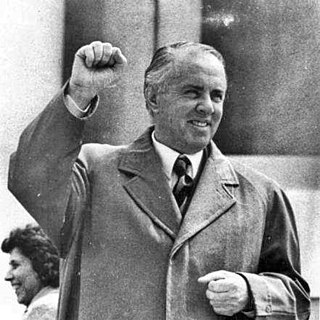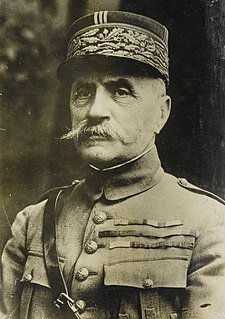A Quote by Deng Xiaoping
Chairman Mao's greatest contribution was that he applied the principles of Marxism-Leninism to the concrete practice of the Chinese revolution, pointing the way to victory. It should be said that before the sixties or the late fifties many of his ideas brought us victories, and the fundamental principles he advanced were quite correct.
Quote Topics
Related Quotes
Chairman Mao creatively applied Marxism-Leninism to every aspect of the Chinese revolution, and he had creative views on philosophy, political science, military science, literature and art, and so on. Unfortunately, in the evening of his life, particularly during the "Cultural Revolution", he made mistakes - and they were not minor ones - which brought many misfortunes upon our Party, our state and our people.
In the last couple of years before Chairman Mao's death he said that the "Cultural Revolution" had been wrong on two counts: one was "overthrowing all", and the other was waging a "full-scale civil war". These two counts alone show that the "Cultural Revolution" cannot be called correct. Chairman Mao's mistake was a political mistake, and not a small one.
Not only did Mao Zedong Thought lead us to victory in the revolution in the past; it is - and will continue to be - a treasured possession of the Chinese Communist Party and of our country. That is why we will forever keep Chairman Mao's portrait on Tiananmen Gate as a symbol of our country, and we will always remember him as a founder of our Party and state. Moreover, we will adhere to Mao Zedong Thought. We will not do to Chairman Mao what Khrushchev did to Stalin.
It should be pointed out that some of the things done after the arrest of the Gang of Four were inconsistent with Chairman Mao's wishes, for instance, the construction of the Chairman Mao Memorial Hall. He had proposed in the fifties that we should all be cremated when we died and that only our ashes be kept, that no remains should be preserved and no tombs built.
How is Marxist-Leninist theory to be linked with the practice of the Chinese revolution? To use a common expression, it is by "shooting the arrow at the target". As the arrow is to the target, so is Marxism-Leninism to the Chinese revolution. Some comrades, however, are "shooting without a target", shooting at random, and such people are liable to harm the revolution.
Mao Zedong Thought was not created by Comrade Mao alone - other revolutionaries of the older generation played a part in forming and developing it - but primarily it embodies Comrade Mao's thinking. Nevertheless, victory made him less prudent, so that in his later years some unsound features and unsound ideas, chiefly "Left" ones, began to emerge. In quite a number of instances he went counter to his own ideas, counter to the fine and correct propositions he had previously put forward, and counter to the style of work he himself had advocated.
We must make a clear distinction between the nature of Chairman Mao's mistakes and the crimes of Lin Biao and the Gang of Four. For most of his life, Chairman Mao did very good things. Many times he saved the Party and the state from crisis. Without him the Chinese people would, at the very least, have spent much more time groping in the dark.
There are certain basic principles regarding the proper role of government. If principles are correct, then they can be applied to any specific proposal with confidence... The true statesman values principle above popularity, and works to create popularity for those political principles which are wise and just.
All the same, the fundamental truths which govern that art are still unchangeable; just as the principles of mechanics must always govern architecture, whether the building be made of wood, stone, iron or concrete; just as the principles of harmony govern music of whatever kind. It is still necessary, then, to establish the principles of war.
It is Chairman Mao who should be held primarily responsible for the Great Leap Forward. But it didn't take him long - just a few months - to recognize his mistake, and he did so before the rest of us and proposed corrections. And in 1962, when because of some other factors those corrections had not been fully carried out, he made a self-criticism. But the lessons were not fully drawn, and as a result the "Cultural Revolution" erupted.
There is nothing so bad or so good that you will not find Englishmen doing it; but you will never find an Englishman in the wrong. He does everything on principle. He fights you on patriotic principles; he robs you on business principles; he enslaves you on imperial principles; he bullies you on manly principles; he supports his king on loyal principles and cuts off his king's head on republican principles.





























